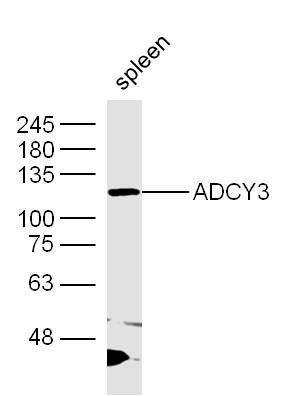产品货号 : mlR20272
英文名称 : ADCY3
中文名称 : 腺苷酸环化酶3抗体
别 名 : A cyclase III; AC3; adenylate cyclase 3; Adenylate cyclase type III; ADCY3_HUMAN; Adenylate cyclase type 3; ATP pyrophosphate-lyase 3; AC-III; Adenylate cyclase, olfactive type; AC3.
研究领域 : 肿瘤 免疫学 染色质和核信号 信号转导 转录调节因子
抗体来源 : Rabbit
克隆类型 : Polyclonal
交叉反应 : Human, Mouse, Rat, Pig, Cow, Horse, Sheep,
产品应用 : WB=1:500-2000 ELISA=1:500-1000
not yet tested in other applications.
optimal dilutions/concentrations should be determined by the end user.
分 子 量 : 126kDa
细胞定位 : 细胞膜
性 状 : Lyophilized or Liquid
浓 度 : 1mg/ml
免 疫 原 : KLH conjugated synthetic peptide derived from human ADCY3:651-750/1144
亚 型 : IgG
纯化方法 : affinity purified by Protein A
储 存 液 : Preservative: 15mM Sodium Azide, Constituents: 1% BSA, 0.01M PBS, pH 7.4
保存条件 : Store at -20 °C for one year. Avoid repeated freeze/thaw cycles. The lyophilized antibody is stable at room temperature for at least one month and for greater than a year when kept at -20°C. When reconstituted in sterile pH 7.4 0.01M PBS or diluent of antibody the antibody is stable for at least two weeks at 2-4 °C.
PubMed : PubMed
产品介绍background:
The cAMP synthesizing enzymes are found in two forms: cytosolic (soluble) and membrane-bound (particulate). Stimulation of adenylate cyclases produce cAMP form ATP in response to the activation of GPCRs by various hormones, neurotransmitters and other regulatory molecules. cAMP, in subsequent steps down the signal transduction pathway, can stimulate cAMP-dependent protein kinase A (cPKA), and several other target molecules. Activation of cPKA can phosphorylate a broad range of substrates that regulate various metabolic pathways, gene expression, and affect memory functions etc. The stimulation of adenylate cyclases starts with interactions with GPCRs mediated signals initiated by Gs and Gi heterotrimeric G-proteins.
Function:
Mediates odorant detection (possibly) via modulation of intracellular cAMP concentration.
Subcellular Location:
Membrane; Multi-pass membrane protein.
Tissue Specificity:
Expressed in brain, heart, kidney, liver, lung, pancreas, placenta, and skeletal muscle.
Similarity:
Belongs to the adenylyl cyclase class-4/guanylyl cyclase family.
Contains 2 guanylate cyclase domains.
SWISS:
O60266
Gene ID:
109
Important Note:
This product as supplied is intended for research use only, not for use in human, therapeutic or diagnostic applications.
产品图片












